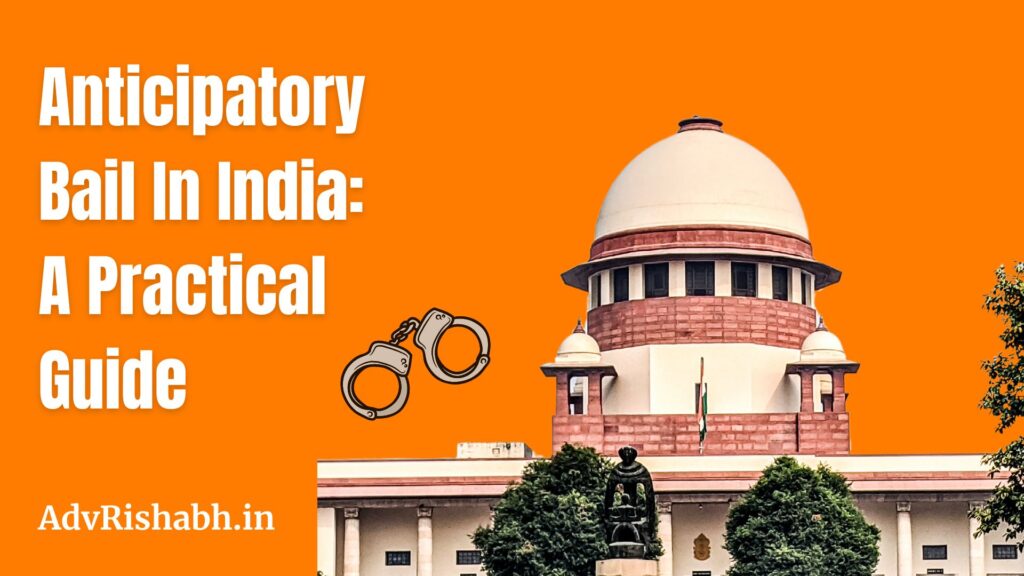According to the National Crime Record Bureau Report 2022 around 1,56,371 people including 1,51,883 men, 4,466 women and 22 transgenders were arrested in 2022 .These numbers highlight the critical need for anticipatory bail in safeguarding individual rights. Anticipatory bail offers a legal shield against the harrowing experience of arrest, making its legal and procedural understanding essential for both legal experts and public.
Understanding the Legal Basis of Anticipatory Bail
Constitutional Provisions: Backbone of Individual Liberty
The right to anticipatory bail is grounded in the Indian Constitution. Articles 21 and 22 play a crucial role here, ensuring the right to life and protection against arbitrary arrest. The judicial interpretation of these articles has evolved through key cases, including Maneka Gandhi v. Union of India and Hussainara Khatoon v. Home Secretary, Bihar, reinforcing individual rights under Article 21.
Anticipatory Bail Under Bhartiya Nagarik Surksha Sanhita 2023
The primary legal framework for anticipatory bail is outlined in the Section 482 of the Bharatiya Nagarik Suraksha Sanhita, 2023 (BNSS). This section empowers High Courts and the Court of Sessions to grant anticipatory bail to individuals apprehending arrest in connection to a non-bailable offense. It’s crucial to note the provisions laid out clearly define the scope and limits of this legal remedy.
Jurisprudence on Anticipatory Bail
The evolution of anticipatory bail has been shaped by landmark Supreme Court rulings. Case citations such as Bashir v. State of Delhi and Gurbaksh Singh Sibbia v. State of Punjab demonstrate how judicial decisions have refined the criteria and considerations for granting anticipatory bail over the years.
Who is Eligible for Anticipatory Bail?
Types of Offenses
Anticipatory bail generally applies to non-bailable offenses, but not all qualify. Offenses involving serious crimes, such as murder or terrorism, are typically less likely to receive bail. Understanding this distinction helps clarify eligibility.
Conditions for Granting Bail
Courts weigh several factors when deciding on anticipatory bail applications. Some of the key consideration is provided under clause 2 of section 482 of Bhartiya Nagarik Surksha Sanhita 2023 are as follows:
- The person shall make himself available for interrogation by a police officer as and when required
- The person must not, either directly or indirectly, offer any inducement, threat, or promise to anyone familiar with the case in an attempt to prevent them from revealing information to the Court or the police.
- The person is not allowed to leave India without first obtaining permission from the Court.
- Any other conditions that may be applied under section 480(3), as if the bail were granted under that section.
Specific Circumstances
Certain circumstances enhance the chances of receiving anticipatory bail. First-time offenders, women, and elderly individuals often find more favorable conditions for bail applications. Cases reflect these trends, underscoring the judiciary’s sensitivity to social contexts.
The Application Process for Anticipatory Bail
Filing the Application
Starting the process involves filing an application, which should include:
- Personal details and reason for seeking bail.
- Any supporting documents.
The application is typically submitted to the Sessions Court or High Court with jurisdiction over the case.
Hearing and Arguments
Once filed, the court sets a hearing date. The prosecution presents its stance, while the defense argues for bail. Evidence and previous case laws are often introduced to support claims.
Court Orders and Conditions
After hearing both sides, the court can either grant or deny bail. If granted, it may come with specific conditions, such as restrictions on travel or regular check-ins with law enforcement.
Consequences of Violating Anticipatory Bail Conditions
Cancellation of Bail
Anticipatory bail can be revoked under certain conditions, such as failure to comply with imposed restrictions or new criminal activity taking place after bail is granted.
Arrest and Prosecution
Violating bail conditions can lead to immediate arrest and prosecution. The legal system treats such violations seriously and may impose severe penalties.
Impact on Future Bail Applications
A history of violating bail conditions can adversely affect future bail applications. Courts are less likely to favor individuals with a track record of non-compliance.
Challenges and Reforms in Anticipatory Bail
Misuse of Anticipatory Bail
Misuse of anticipatory bail poses challenges for the justice system. Statistics indicate that it can be exploited by individuals to evade legal accountability, leading to public skepticism about the process.
Need for Reform
Calls for reforms focus on enhancing guidelines for granting anticipatory bail. The goal is to address misuse while ensuring genuine applicants receive protection. Ongoing discussions within legal circles emphasize the need for a balanced approach.
Role of Law Enforcement
Law enforcement agencies play a pivotal role in executing anticipatory bail orders. Their adherence to judicial directives is vital for upholding the rule of law.
Actionable Tips for Seeking Anticipatory Bail
Choosing the Right Lawyer
Finding an experienced criminal law attorney is essential. A knowledgeable lawyer can dramatically improve the chances of getting anticipatory bail.
Preparing a Strong Application
A compelling bail application should detail reasons clearly and include supporting evidence. The stronger the application, the higher the likelihood of approval.
Understanding Your Rights
Individuals should know their rights when applying for anticipatory bail. Awareness promotes informed decisions and fosters a fair legal process.
In summary, anticipatory bail in India plays a crucial role in preserving individual freedoms. Understanding the related procedures ensures that all parties engage appropriately with the legal system. Striking a balance between individual rights and the rule of law is paramount for maintaining justice.

